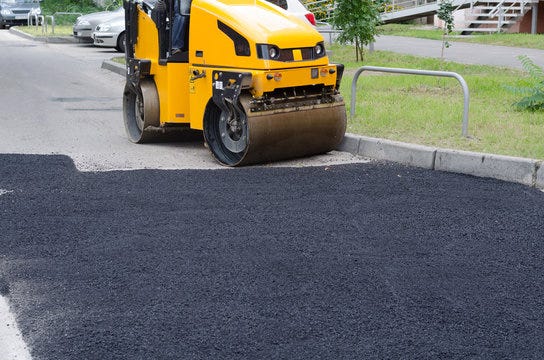Asphalt and concrete are among two of the most robust material categories used for construction purposes. The two have diverse physical and mechanical properties to cater to the industry for stronger infrastructures and road pavements. Pavements play are crucial role in the success and longevity of any construction site; while both can be used for it. However, both have their advantages and disadvantages but selecting the appropriate one can make a big difference in terms of durability, environmental impact, and cost. Asphalt quality testing and concrete testing in Edmonton are performed to evaluate the pros and cons of each material to aid contractors, engineers, and project managers in making an informed decision.
Explore Variances in Asphalt Quality Testing and Concrete Materials
Asphalt and concrete are usually utilized in construction projects, particularly for road pavement. Each offers distinct characteristics that may differ in composition, installation methods, durability, appearance, and maintenance requirements. These physical and mechanical variances influence the decision-making process for roadways and construction activities.
- Asphalt is a black or dark brown sticky material with a slightly rough texture. It comprises aggregates (like gravel, sand, and crushed stone) combined with a petroleum-based binder. Concrete offers versatility in texture and color depending on the components (cement, water, and aggregates) in the mixture.
- Asphalt is rolled using a paving machine to spread a hot mixture onto a prepared surface and compact it for a smooth finish. Asphalt Quality Testing yields it to be more flexible and less prone to cracking under extreme temperatures or heavy loads. However, it is more susceptible to destruction from oil and gasoline spills. Conversely, concrete is less flexible. Its pouring needs compaction and leveling using hand tools but is resilient to environmental factors like UV exposure. Both are robust and durable materials but exhibit different characteristics.
- Regular maintenance is important for both using asphalt quality testing and concrete evaluation in a material testing lab in Edmonton. Asphalt involves periodic sealing to defend against UV rays and water damage. Concrete may require resealing every 5-10 years for appearance protection and shield against stains and weathering.

Performance and Suitability Analysis
The selection between asphalt and concrete depends on many factors such as cost, climate, and intended application. However, when specifically, about road construction, there is a sheer need to understand the unique attributes. This helps the engineers and contractors to make informed decisions for pavements.
Cost Comparison
Asphalt generally emerges as the more budget-friendly option for lesser production and installation costs. Also, it demands less maintenance over time. However, the initial expense for concrete might be higher but has an extended lifespan. These pavements need less frequent repairs resulting in long-term cost savings. This evaluation of both for short-term costs. But when it is time for repairs, asphalt is cheaper while concrete requires a budget for a construction project. Critical asphalt quality testing must be carried out to evaluate its long-term effect.
- Durability and Maintenance for Longevity
Concrete roads tend to reveal greater durability and require less frequent repairs compared to asphalt roadways. Concrete Quality Testing is a sturdier material and can withstand heavier loads & harsh weather conditions. Contrasting asphalt, it does not soften in high temperatures with a reduced likelihood of cracks and potholes. However, if repairs are requisite, they can be more expensive and time-intensive for concrete roads. While asphalt roads may need more regular repairs but easier and less expensive to fix. Asphalt quality testing and careful compaction and rolling at the time of road pavement with the specific needs turn out to be budget-friendly options for your construction project.
- Environmental Impact for Sustainability Considerations
Exploration of the environmental impact of asphalt and concrete roads reveals both advantages and drawbacks. Asphalt is derived from petroleum binder, a non-renewable resource that contributes to greenhouse gas emissions during its production. However, it can be recycled and reused alleviating the demand for new materials. Concrete has a notable carbon footprint with cement as a main ingredient boasting a longer lifespan. This reduces the necessity for frequent replacements. Ultimately, the sustainability of each material pivots on factors like material sourcing, transportation, and disposal methods.
Selecting the Appropriate Material for Your Roadway Construction.
When faced with the final decision between asphalt and concrete for your road pavement project, asphalt is generally more cost-effective and quicker to install. Multiple factors merit consideration making it a popular choice for construction projects or those constrained by financial considerations. Furthermore, the climate and meteorological conditions deliberate asphalt with emphasized asphalt quality testing to align with project-specific requirements and conditions.
Considering the following key points to select asphalt as the pavement companion involves careful evaluation of various factors and asphalt quality testing in Edmonton:
- Climate: Edmonton is coldest in winter and the region experiencing extreme temperature fluctuations. like freeze-thaw cycles. Asphalt Material Testing in Edmonton yields it is less prone to cracking under such conditions. Also, environmental sustainability is a priority and asphalt may be preferable due to its recyclability.
- Traffic: Asphalt quality testing showed its flexibility and load-bearing capacity under higher loads. The volume and nature of foot traffic are influential factors in making it a more suitable choice.
- Cost: Asphalt generally comes at a lower cost and easy rolling over the surface making it an attractive option for pavement in construction projects. Especially those working within a limited budget.
- Maintenance: The anticipated maintenance necessities for asphalt need regular sealing, patching, and crack repairs. But the overall maintenance is budget-friendly.
The Ultimate choice between asphalt and concrete hinges on an inclusive assessment of these factors that aligns seamlessly with the exclusive needs and circumstances of the project at hand. However, asphalt is a cheaper, viable, and sustainable solution for seamless roadways. It may be beneficial to consult a material testing services company in Edmonton like Central Material Testing to determine the best material for the pavement job. We have done a hundred-plus projects and facilitated them with quality testing for assurances and decision-making steps. Get the quotation for your next project.\



Leave a Reply